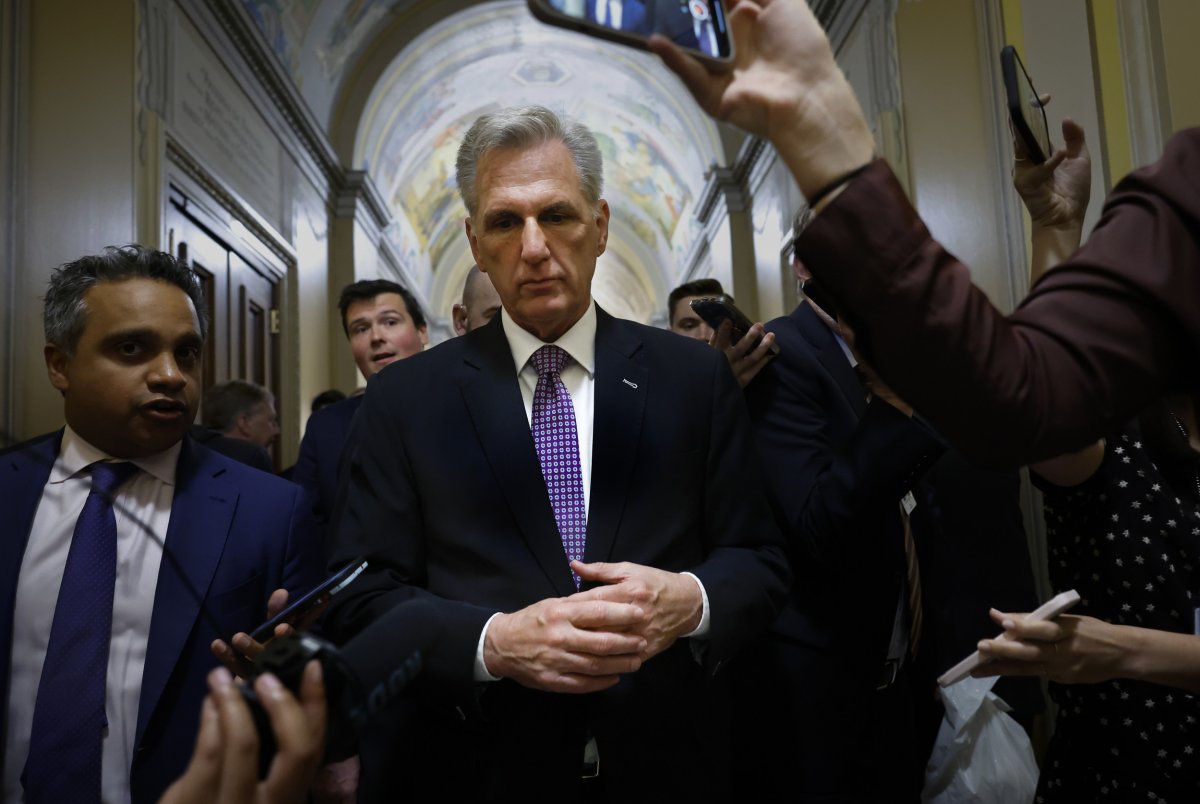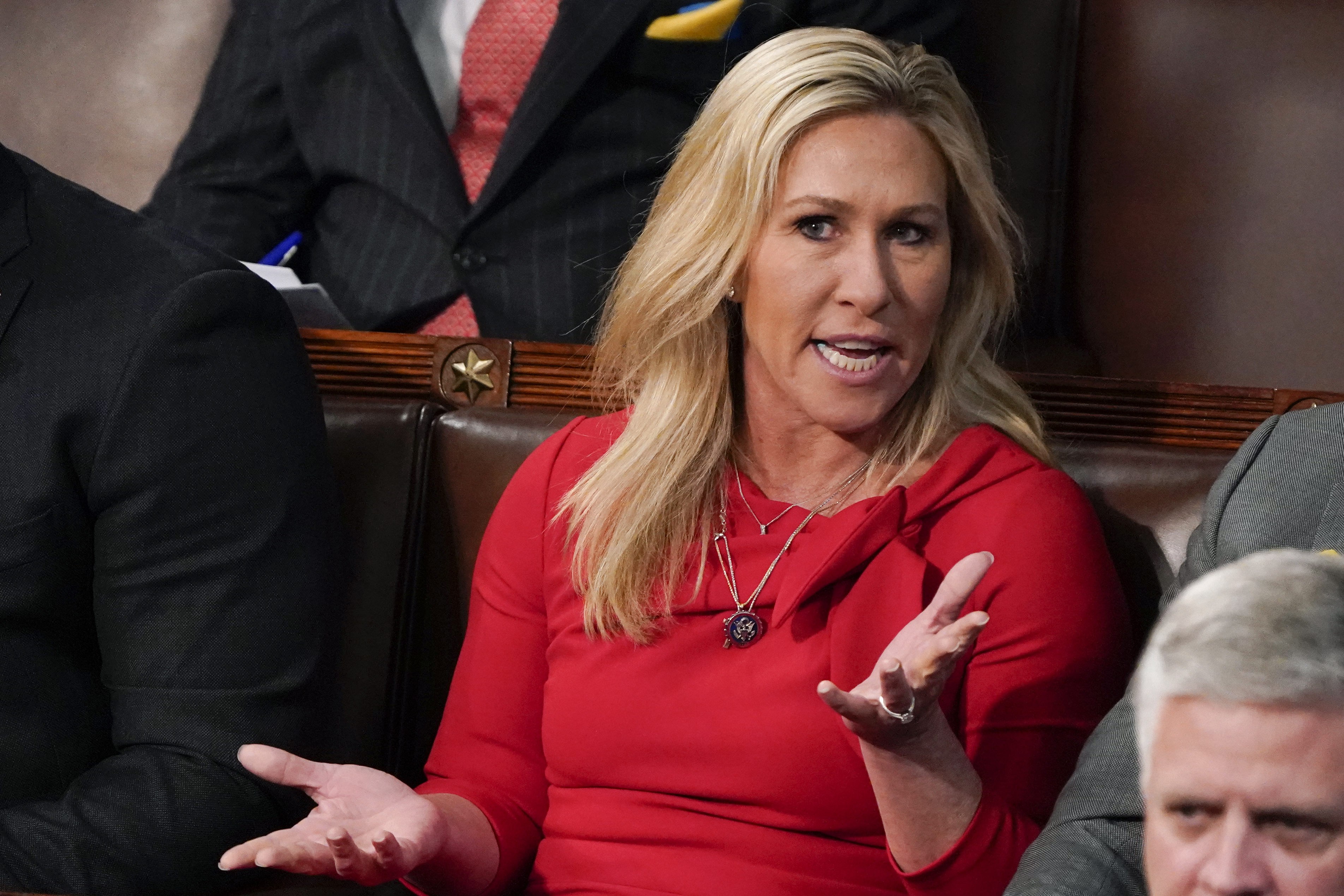Eight days—that is all the time Congress has left to raise America's borrowing limit before the country reaches its estimated default date. At least three of those days will be spent reviewing whatever deal ultimately materializes, and Democrats aren't happy about it.
"It looks to me like [Speaker Kevin] McCarthy is trying to get a default," Democratic Congresswoman Zoe Lofgren of California, a close ally of former Speaker Nancy Pelosi, told Newsweek.
Under Pelosi, House leadership at times waived a rule requiring 72 hours to review a bill between the time it is publicly introduced and voted upon. However, McCarthy has committed to abiding by this rule, significantly trimming the time Congress has left to pass a deal before the June 1 default date provided by Treasury Secretary Janet Yellen.
This place needs to stop working on: 'Well, we'll wait to the last minute, and we'll jam it through because everybody will just fold.'
Under typical circumstances, a bill can take roughly a week to pass through the Senate. Any deal struck between President Joe Biden and McCarthy will also need to be put into legislative text. McCarthy's insistence on a three-day House review means the Democratic-controlled Senate will need to act on the bill at an unusually rapid pace.
Republican Congressman Chip Roy of Texas, policy chair of the hard-right Freedom Caucus, emphasized that upholding this rule is necessary despite the nearing deadline, arguing that it provides much-needed time for members to review the bill and ensure it is being accurately represented.
"This place needs to stop working on: 'Well, we'll wait to the last minute, and we'll jam it through because everybody will just fold,'" Roy told Newsweek. "[In that case] you don't have enough time to make sure the bill is actually what people were saying it is. You don't have enough time to go work with colleagues to make sure that what we're trying to ram through is actually good policy."

The 72-hour rule became a priority for conservatives like Roy during the previous Congress when Democratic leadership waived the provision to pass a $1.7 trillion omnibus spending bill that funded the government through most of 2023, just one day after the Senate passed its version of the bill.
While the Senate version received bipartisan support, House Republicans, then in the minority, largely rejected the proposal, saying 2023 spending levels should not have been set until new members took office. Lingering concerns over the short turnaround time of that legislation resulted in conservatives seeking McCarthy's commitment to abide by the 72-hour rule as part of the deal that earned him the role of Speaker.
Although GOP leadership has largely abided by this promise, it has broken the rule at least once, when House Republicans brought forth their debt limit negotiation starting point—the Limit, Save, Grow Act—which passed last month.
72 hours means 72 hours. This is a 72-hour hard and fast commitment.
Roy said that he does not think the U.S. will default on the June 1 date provided by the Treasury Department, a sentiment shared by others within the Republican Conference. He told Newsweek that he sees Yellen's forecast date as a time when cash flow will be "getting tight," but said the government should have enough funds to pay off its immediate bills.
A key Republican in the negotiations is Congressman Patrick McHenry of North Carolina, who chairs the Financial Services Committee and was selected by McCarthy to negotiate with White House officials. Although McHenry has expressed similar doubts about the June 1 date in the past. on Tuesday he told reporters on Capitol Hill that he sees the date as legitimate, saying "they don't play games" at the Treasury Department.
Speaking to reporters on Tuesday, he acknowledged that with negotiations ongoing and any eventual deal still needing Senate approval, the time left for Congress to act is limited. Nonetheless, he too emphasized that the 72-hour rule will be followed.
"72 hours means 72 hours," McHenry said. "This is a 72-hour hard and fast commitment."

Congressman David Cicilline, a Rhode Island Democrat, condemned this line of thinking, sharing Lofgren's assertion that leadership's commitment to ensuring rank and file members are afforded three days of review is reckless in this situation, as the U.S. faces a potential recession should it default on its debts.
"I think it's irresponsible," Cicilline told Newsweek. "We need to be sure that the United States doesn't default on its obligations. The Republicans put forth a proposal that did not earn a single Democratic vote—It's not a serious proposal."
I generally support members having time to understand what's in the bills that they are voting on. It's hard to say how much time we would need for a debt ceiling bill without knowing how complicated it is.
The GOP's Limit, Save, Grow Act that he referenced provides House support for raising the debt ceiling only if Congress lowers the national debt by introducing caps to keep increases to discretionary spending down to one percent each year for the next decade. It also requires the government to claw back unspent COVID-19 funds, cut funding for the hiring of new IRS agents, reform the energy permitting process, and institute revised work requirements for individuals receiving certain government benefits, among other things.
While the Biden administration has expressed a willingness to engage on permitting reform, many of the other issues remain contentious. McHenry told reporters that spending caps in particular, the greatest vehicle in the GOP proposal for lowering the over $31 trillion debt, remain an object of contention.
In remarks following his meeting with McCarthy on Monday, Biden expressed optimism despite the clock winding down, calling his Monday conversation with McCarthy "productive," while the Speaker told reporters that he believes "we can get it done." If that eventual deal ends up requiring a 72-hour review period, it will likely be Senate Majority Leader Charles Schumer who will be tasked with pushing his chamber to come in ahead of a fast-approaching deadline.
Congresswoman Katie Porter, a California Democrat who is running for the U.S. Senate and recently released a book titled, "I Swear: Politics Is Messier Than My Minivan," detailing the challenges of being a parent who must work under Congress' sporadic schedule, offered a different perspective on the 72-hour rule.
While she did not vote in favor of the Limit, Save, Grow Act and has warned of the financial consequences of a default, she said she appreciates the 72-hour rule, and said the time that it affords legislators may prove necessary for Democrats in order to get a thorough understanding of the deal that is ultimately reached.
"I generally support members having time to understand what's in the bills that they are voting on," she told Newsweek. "It's hard to say how much time we would need for a debt ceiling bill without knowing how complicated it is."
"If we ended up with a raise in the debt ceiling, that's a bill I can analyze in a couple minutes," Porter explained. "If it is a whole rework of gigantic programs that constituents depend on, I'm not sure even 72 hours is really adequate to assess it."
Uncommon Knowledge
Newsweek is committed to challenging conventional wisdom and finding connections in the search for common ground.
Newsweek is committed to challenging conventional wisdom and finding connections in the search for common ground.
About the writer
Alex J. Rouhandeh serves as Newsweek's congressional correspondent, reporting from Capitol Hill and the campaign trail. Over his tenure with ... Read more
To read how Newsweek uses AI as a newsroom tool, Click here.








